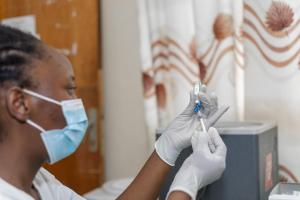Combatting COVID-19 through home-based care
“As a doctor, there are calls you can’t ignore. When there is a health emergency in your community, it is your responsibility to be part of the solution,” says Dr Emile Rwamasirabo, a urological surgeon who participated in Rwanda’s home-based care initiative for COVID-19.
Dubbed Operation Save the Neighbour, with technical support from the World Health Organization (WHO), the initiative adapted the Organization’s guidance on home-based care to the local context. This strategy was first initiated in one district (Gasabo District in Kigali City) and served as a model for other districts. In doing so, it sought to save lives at the community level and reduce the burden on hospitals by integrating doctors like Dr Rwamasirabo into home-based care teams.
“As a doctor, there are calls you can’t ignore. When there is a health emergency in your community, it is your responsibility to be part of the solution.” – Dr Emile Rwamasirabo, urological surgeon.
The approach also strengthened the support system around community health workers, Each CHW was responsible of cases within the village, depending on the number of cases detected.
Through Operation Save the Neighbour, patients’ and doctors’ geolocations were mapped, then doctors paired with community health workers to attend to cases within walking distance.
“As community health workers, our knowledge and skills are limited, and the population is aware of that,” says Rutagarama Wendislas, lead community health worker in Gisozi Sector in the Rwandan capital Kigali. “Knowing we can just pick up the phone and ring a doctor for support has boosted our confidence and created trust among the population.”
Operation Save the Neighbour has had a positive impact on Rwanda health systems. From 429 active cases during the second wave of the virus, oximeters were distributed to community health workers, and they could monitor more than 80% of patients in home-based care. 97% of patients were treated at home
The case fatality rate—the percentage of deaths among confirmed cases—in Rwanda has improved significantly. In 2021, 1258 were recorded among 103 404 cases compared to only 116 deaths among 20 491 identified cases between January and July 2022, according to the Ministry of Health and the Rwanda Biomedical Centre.
The home-based programme has freed up critical hospital space for patients suffering from more severe conditions.



